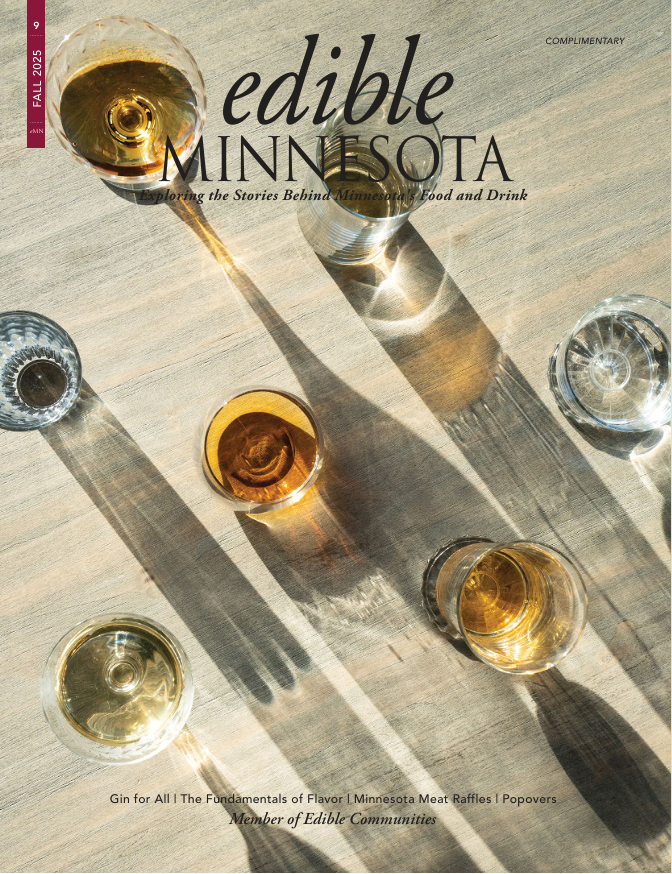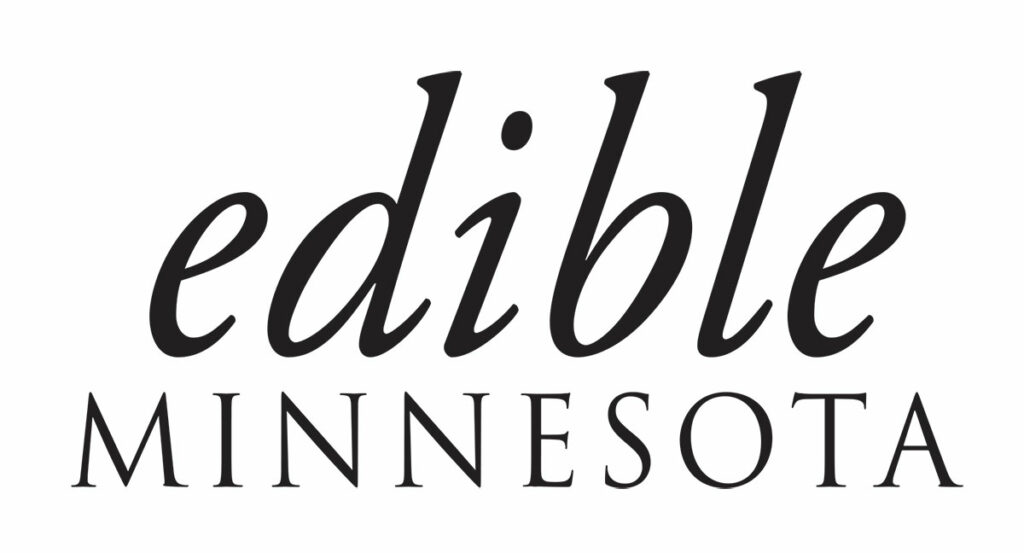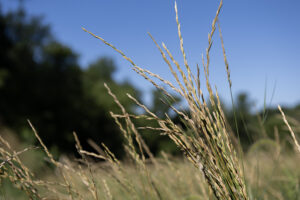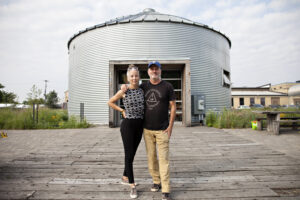Meet Bang Brewing and Sturdiwheat
By Michelle M. Sharp
Does your favorite pancake mix or locally-crafted brew filter stormwater runoff, improve water quality and work towards a healthier future for Minnesota’s rivers? If it carries the Perennial Percent label, it already has.
What, you ask, is this label? Perennial Percent is the first label for consumer packaged goods (CPGs, or finished products found on grocery or liquor store shelves) that identifies the inclusion of a perennial grain as a part of the recipe. Managed by The Land Institute in Kansas, this new food and beverage identification highlights both an ingredient and a regenerative agricultural practice at the same time, empowering consumers to consciously choose products that contain climate-positive ingredients and help drive agricultural production of these beneficial ingredients
Kernza®, an intermediate wheatgrass, is the rising star of this labeling program. As a perennial grain that resprouts, Kernza does not require annual planting. In fact, each plant produces grain for three to five years. Skipping the steps of tilling and
planting annually protects the prized layer of topsoil essential for thriving crops and reduces runoff of nutrient-rich topsoil into our water system.
The benefits of Kernza start in the field and literally trickle downstream. Minnesota’s private and public water wells in agricultural zones are much more likely to have nitrate concentrations higher than EPA standards for drinking water than those outside these areas, simply due to runoff from farm fields. Renowned for its ten-foot-deep root bundles, Kernza’s roots naturally filter nitrates from the water as it passes through the ground. Its surface growth is a cover crop that reduces soil erosion.
Seems like we should be planting Kernza everywhere, doesn’t it? So why aren’t we?
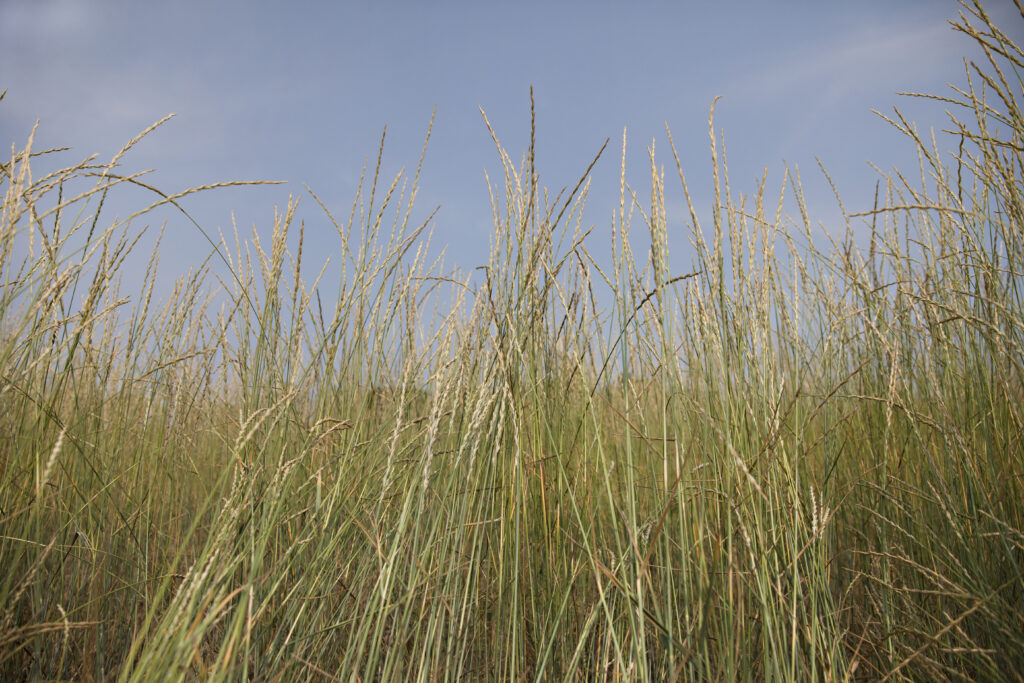
The challenge remains to incorporate greater amounts of Kernza, whether as a whole grain or milled into flour, into consumer products to establish a viable market for farmers to sell the grain. If there’s no market for it, it’s hard for farmers to dedicate their time, land and financial resources to the plant–no matter how positive the environmental benefits.
Hana Fancher from The Land Institute explains how the Perennial Percent label connects consumers with the research and development already invested in perennial grains and drives awareness so consumers recognize the agricultural practices their purchase supports. The Perennial Percent label tells consumers as much about a product as seeing a B Corp certification label tells them about a company’s social and environmental practices. Producers may include a QR code on their packaging to link consumers to the Kernza.org website to explore Kernza’s unique properties. “Farmers are eager for a new tool that promotes demand and builds interest,” states Hana. “Perennial Percent gives them an opportunity to improve their soil and build a reliable market for this resourceful product.”
To qualify for the Perennial Percent label, CPG producers must include at least one percent of Kernza grain among the ingredients in their recipe. “Perennial Percent is one strategy among many to grow the market and help farmers move their product,” shares Colin Cureton, the Director of Adoption and Scaling at the University of Minnesota’s Forever Green Initiative. “I hope people are excited to see these real life examples of continuous living cover crops being something we can choose to buy in the grocery store.” The Forever Green Initiative partners with Minnesota’s rural communities to research, develop, scale and find commercial markets for sustainable agricultural crops.
Minnesota is a hub of innovation for this emerging product. “At least half the Kernza seed available for planting is produced by Minnesota companies,” shares Colin. “For food and beverage producers, four of the six distributors in the United States are right here.”
Although Minnesota leads the way in market growth, Kernza is still a small player in our vast agricultural landscape. Of the 26 million acres identified by the Minnesota Board of Water and Soil Resources as agricultural (nearly 51% of the state’s total land), only 1600 acres of Kernza had been planted throughout the Midwest as of the end of 2024. According to The Land Institute’s 2024 Kernza Supply Report, this number is growing with over 400 new acres of Kernza having been established in Minnesota in 2024.
A key challenge for any new product is finding its audience. Consistent support from food and beverage producers and consumers makes all the difference in Kernza being able to take root (pun intended).
Bang Brewing in Saint Paul and Sturdiwheat in Red Wing include Kernza across their product lines. Initially, both Sandy and Jay Boss Febbo of Bang Brewing and Missi and Suzanne Blue of Sturdiwheat developed recipes that intentionally brought Kernza’s naturally nutty flavor and cinnamon undertone forward in products like Bang’s Kernza lager and Sturdiwheat’s Cinnamon Kernza pancakes. Both products feature an unexpected but unmistakable and enjoyable burst of flavor from the grain. With the success of these initial recipes that center Kernza as the star ingredient, they then recognized an additional opportunity to be leaders in a piece of the regenerative agriculture puzzle. They realized that by including a small amount of Kernza grain or flour in a wider range of products, they could significantly increase the demand for the grain without changing their base product lines and the flavors their customers already loved.
The Perennial Percent label is a reminder of how our grocery store purchases have impacts beyond what we eat for dinner. Choosing to incorporate a regenerative agricultural product like Kernza makes it possible for farmers to dedicate acreage to the plant. As a result, more soil and groundwater benefit from deep root filtration, which improves water quality in public and private wells, lakes and rivers. It really is all connected.
It’s a lot to ask of a plate of pancakes or a pint of beer, but Sturdiwheat and Bang Brewing have met the challenge head-on by bringing delicious and responsible Kernza recipes to life.
Meet Sturdiwheat
Sturdiwheat is a Minnesota heritage brand that has produced thousands of bags of pancake and bread mixes in downtown Red Wing for over 80 years. “There’s a lot of pride in being a Minnesota company,” states Missi Blue, who now stewards the company along with her mom Suzanne Blue. “Adding Kernza to our ingredients is another way of supporting the state and the community that supports our business.”
Missi grew up along the Mississippi River and Lake Pepin and is a passionate advocate for the river’s and lake’s water quality. A former vice chair of the Lake Pepin Legacy Alliance (LPLA), Missi is an active member of the board and the science committee. LPLA is a champion of Kernza perennial grain, hosting educational and advocacy events to protect the waterways that make Red Wing shine.
Her deep connection to Red Wing’s local waterways piqued Missi’s interest in Kernza. After learning about Kernza through her work with LPLA, Missi wanted Sturdiwheat to be part of the solution for growing the grain’s market. “Kernza is a perennial grain grown right here in Minnesota to protect our beautiful waterways. Sturdiwheat uses a lot of flour to make our products,” reflects Missi, when asked about her motivation to incorporate Kernza into Sturdiwheat’s product line. “Being nimble enough to address a problem when you discover it is part of the fun of being a small business. [After learning about Kernza,] we got to work right away to develop mixes including Kernza flour.”
From the start, Sturdiwheat’s mixes have celebrated a rich grain profile. The company founder, Arnold Kaehler, accidentally included layers often discarded in milling wheat when the casing on his portable grinding mill broke. He loved the taste and the improved nutrition that resulted from the “mistake.” For the twenty-first century recipe update, Kernza’s rich nutty flavor adds a new taste profile to their easy-to-prepare mixes. “We developed mixes that are a blend of Kernza and traditional wheat flour,” explains Missi. “We wanted to see how it tasted. We loved it.” Sturdiwheat released both a pancake and a muffin Kernza-forward mix in the fall of 2022.
To increase the amount of Kernza used in their recipes, Sturdiwheat’s team looked to their established product line. Instead of making Kernza the star ingredient, it can be used in small quantities without changing the flavor of customers’ long-standing favorites. Doing so gradually increases demand for Kernza through established product lines.
Missi sees the Perennial Percent label as a win—for her family’s business, for Minnesota farmers, for Minnesota’s waterways and for all of us who enjoy our lakes and rivers. “When you purchase our Original or Buckwheat pancake mixes, the work has already been done. You’re eating the good. Being a member of Perennial Percent is not a promise for the future,” explains Missi. “At the moment that you purchase our product, the positive impact has already happened.”
Meet Bang Brewing!
Within a 30,000 bushel grain bin in the middle of Saint Paul, Sandy and Jay Boss Febbo know where the grains and hops they brew come from. They have crafted each batch of beer with organic and sustainably-farmed ingredients since opening in 2013. When asked why, Sandy answers, “Individual actions matter.” Jay nods and adds, “We look to be as responsible as possible. Every life decision is an opportunity to consider how you can do better, how you can minimize your footprint and environmental impact while increasing the benefits for the community.”
Bang Brewing first brewed with Kernza for The Land Institute’s annual meeting in 2017. “Everyone assumed we would bury Kernza behind hops and other ingredients,” shares Sandy. “We decided we needed to know what this grain tastes like to really understand how we can best use it. Some people were afraid that it would have a grassy taste, that it wouldn’t stand up as the star ingredient. It turns out that Kernza is such a beautiful ingredient. We were thrilled it could be showcased.”
The third brewery to open in Saint Paul, Bang Brewing did things differently from the start. “We came to brewing because we enjoy beer and we enjoy working in the kitchen together,” says Sandy. “Owning a microbrewery, becoming a brewing collaborator with Patagonia and educating customers about Kernza were not part of my expected career path. I wouldn’t change a thing.” Bang Brewing is the only taproom in Minnesota to be one of Patagonia Provision’s Regional Taproom Partners. This program is part of Patagonia’s efforts to fight our environmental crisis through agriculture.
Working in small batches, Sandy and Jay explore regional flavors, noticing how a crop of Kernza tastes different when it comes from northern versus southern Minnesota. It’s a true celebration of terroir. “Using some Kernza in every batch that we brew allows us to protect our water, an essential part of any beer recipe,” states Sandy. “When you live in this part of the upper Midwest, our water is so precious. It’s had so much pollution thrown at it. Kernza’s ability to heal water through the land is just inspiring.”
The percentages of Kernza in Bang Brewing’s beers vary from 17% in the Kernza Lager to seven percent in the Kernza Farmhouse. Any recipe developed before working with Kernza will have a low percentage so as not to change the base flavor. “For other brews, we’ll tuck it in and see how it impacts the recipe,” smiles Jay.
“We hope this is an encouraging story for people to come to know our business and our beer,” says Sandy. “Our goal is to have the biggest impact with the smallest footprint in everything we do. It’s pretty awesome.”
Get In Touch
Visit Bang Brewing year round. Outdoor seating available seasonally. Hours, current beer menu and information about their pollinator garden and other sustainability efforts at https://www.bangbrewing.com/
Order pancake, bread, muffin and dessert mixes from https://www.sturdiwheat.com/ Check your grocery store shelves for the Perennial Percent label on their two pound pancake and crepe mixes.
Ready to explore Perennial Percent for your food and beverage recipes? Explore https://kernza.org/ and the Forever Green Initiative https://forevergreen.umn.edu/
Michelle M Sharp is the founder and content creator of Meet the Minnesota Makers. Join her community of Minnesota small businesses at meettheminnesotamakers.com or @meettheminnesotamakers. Discover a new local business to love!
